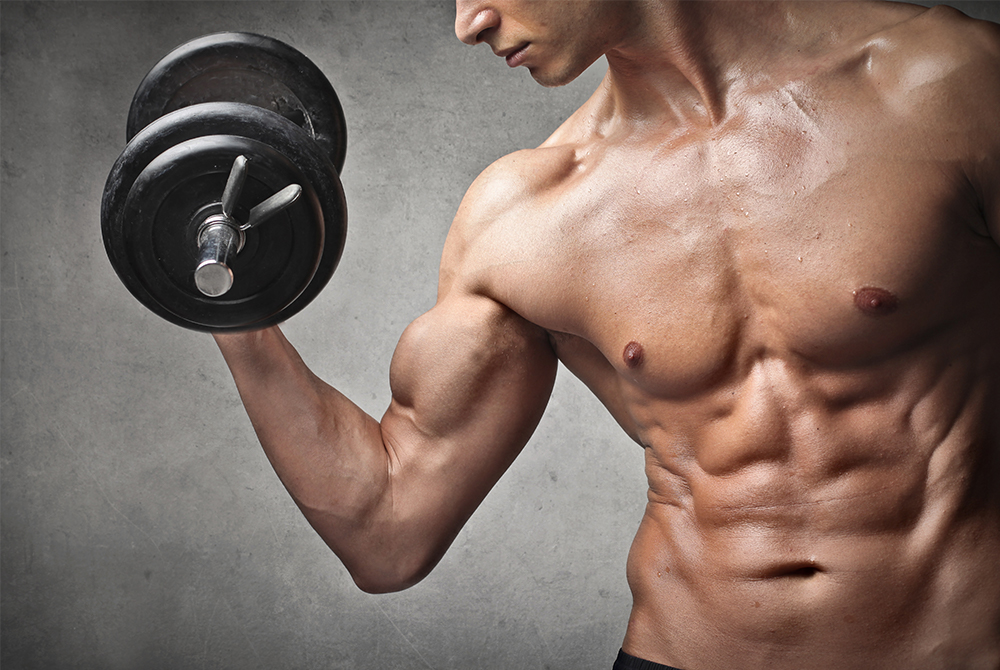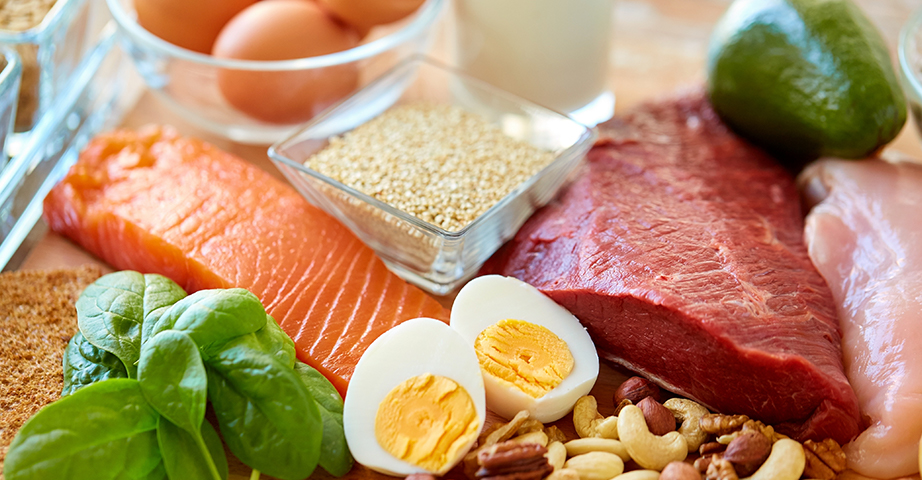Diet, nutrients and mass supplements. All about products for muscle mass gain

Increasing muscle mass is a more difficult process than losing fat tissue. It requires a lot of patience, proper nutrition and regular work at the gym. Workout without a carefully designed diet for bulking will not bring such good results. Diet alone without training will only end in excess body fat. How to compose a diet for muscle mass gain? What to eat? What nutrients and supplements should be used?
Bulking diet - what to eat?
Bulking diet is commonly known as a diet that allows you to increase your pure muscle mass. No one wants to increase body mass in general, where weight gain is dominated by fat tissue. A diet for muscle mass is simply a diet with an increased calorie and protein proportion that allows for weight gain. To achieve the effect of the increased lean body mass, apart from a properly designed diet, strength training with a heavy load is essential. Only proper training provides sufficient stimulation for muscle growth and the use of calories as well as protein for their construction, instead of being deposited in fat tissue. Eating protein alone is not enough, as excess energy from protein is also stored as body fat.
The main workout during a bulking diet is resistance training with weights, which is responsible for increasing muscle size and strength. In addition, many people introduce aerobic training, which minimises the risk of fat accumulation.
Recommended products for increasing muscle mass
What to eat for bulking?
First of all, to build good quality mass, the diet should be healthy. The fact that you can eat more calories does not completely release you from taking care of the food quality. Good products for bulking are:
- fresh meat, high-quality ham and sausages (nearly 100% meat),
- fatty and lean fish,
- eggs,
- dairy products - mainly cottage cheese, quark, skyr yoghurt, cheese; they contain much more protein than milk and "normal" yoghurt,
- nuts and peanut butter, seeds,
- bread (it doesn't always have to be wholemeal, just high-quality), groats, rice,
- pasta, potatoes,
- butter, cream,
- vegetable oils,
- pulses
- vegetables and fruit.
Eating for bulk does not vary from healthy food in the selection of products. It differs in calorie content. In a weight gain diet, a lot of attention must be paid to the right amount of protein and then carbohydrates. Fat is not harmful in a diet for muscle mass. You can eat it even in large quantities, but only from good sources, not fries from fast-food restaurants. Diets for bulking can often be problematic because of the amount of food you have to provide yourself to cover your calorie needs. Fat helps to provide it easily and makes food tastier.
To eat healthy while bulking, you don't have to follow the recommended products 100%. In every diet, there is a place for something sweet or pizza from time to time. However, it is important not to make it a routine. Building muscle mass without a proper diet results in a greater risk of uncontrolled growth of fat instead of muscle.

Bulking diet - the rules of creating a menu
When creating a menu for a diet to build muscle mass you need to start with setting calorie requirements. How to do it best? Weigh yourself daily for 5-7 days and use an app to record everything you eat so you can total your daily calorie intake. If over the week, your weight doesn't change, it means that the number of supplied calories covers your body's energy expenditure. Add 15% to this averaged value.
Example
Daily caloric requirement is 2800 kcal. In the mass gain diet it will be 2800 + 2800*0,15 = 3220 kcal (calorie surplus).
With changing body weight, it is necessary to control caloric requirements at least once a month. It is advisable not to gain more than 0.5-1% of body weight per week, as the ability of muscles to grow is limited. It helps to avoid excessive increases in body fat.
Apart from calories, the proportions of protein, fat and carbohydrates are very important in a bulking diet. The recommended balance of macronutrients is as follows:
- 2.3-3.1 g protein per kg lean body mass or 1.8-2.0 g protein per kg total body mass, usually about 20-25% energy from protein,
- 55-60% of energy from carbohydrates,
- 15-30% of energy from fats.
How many meals to eat on a bulking diet? For quite a long time, it has been said that a diet for muscle mass should contain at least five meals. In reality, the number of meals can be any number, and it all depends on how often and in what volumes you prefer to eat. No research has shown that five smaller meals are in any way better than three large meals.
Example of bulking diet
The following diet menu for muscle mass gain provides approximately 3000 kcal, 160 g protein, 89 g fat and 400 g carbohydrates. It is only a sample weight gain diet. Each diet should be individually adapted to the needs of your body, training and the amount of lean body mass.
Breakfast: chocolate semolina
Ingredients: 50 g semolina, 250 ml milk, 200 ml water, 100 g cherries, 30 g cashew nuts, 3 dark chocolate cubes, 30 g oatmeal Preparation: Cook the cereal in milk and water, at the end of cooking add the chocolate, stir to melt. Put it in a bowl, put the cherries and nuts on top.
Lunch:
Ciabatta roll spread with 20 g of hummus + 30 g of cheese + 30 g of ham + vegetables + glass of orange juice
Dinner: Burrito with turkey
Ingredients: 200 g of ground turkey breast, 2 wheat tortillas, 150 ml of tomato passata, 60 g of canned red beans, 30 g of canned corn, half an onion, a clove of garlic, half a pepper, 50 g of rice (cook), 30 g of mozzarella, 10 ml of olive oil
Preparation: Fry the chopped onion and garlic in the oil. Add the meat. Season with salt, pepper and chilli, add the tomato passata and the vegetables, stew for a few minutes. When the sauce thickens, add cooked rice and chopped mozzarella. Spread the filling on two pancakes, roll up the tortillas and bake in a dry frying pan or a large toaster.
Supper: Protein-fruit smoothie
Ingredients: Soya milk 200 ml, natural skyr 150 g, banana, strawberries 150 g, peanut butter 20 g, honey 10 g, oat flakes 20 g
Preparation: Blend all ingredients.

Bulking supplements
Basically you can distinguish between three types of mass gainers:
- protein supplements, which contain only protein,
- a bulk nutrient,which provides protein and carbohydrates in a 1:1 ratio,
- gainer, which provides mainly carbohydrates and smaller portions of protein, usually in a 4:1 ratio.
A protein supplement is a source of the building block for muscle mass growth. It should be used if the amount of protein eaten with food in the diet for a mass gain is too low. Protein increases the proportion of free amino acids in the body and stimulates muscle protein synthesis. Without it, it is impossible to repair micro-damage to the muscles, which takes place during training. Protein deficiency causes a lack of effects in muscle growth, and may even cause the loss of them. That is why protein is one of the best mass gainers.
Which whey protein to use for mass gain? Whey protein is most often recommended as a high-quality protein with great bioavailability and absorption. Another choice is soya protein, but this type of supplement is mainly used by vegetarians. According to studies on its effectiveness, it performs worse than whey protein. The best bulking product will be whey protein hydrolysate – a source of rapidly digested, partially decomposed proteins, whose use ensures the fastest post-workout muscle regeneration.
Other bulk supplements contain not only protein but also carbohydrates. Their role is primarily to provide energy in the form of carbohydrates, followed by protein. Both bulks and gainers are nutrients recommended for people whose diets are very high in calories and who find it difficult to provide the required number of calories from regular food. The diet is often supported with carbohydrate supplements for mass by ectomorphs who complain about a very fast metabolism, and their energy demand is higher. Another group that often uses these supplements to build muscle mass, are experienced weightlifters and bodybuilders.
Muscle mass supplements - which ones should I use?
Which supplement should I use for mass gain? Apart from protein supplements or gainers, it is worth including other mass gaining supplements in your everyday diet. One of the best researched and most effective supplements for muscle mass is creatine.
Creatine has been a sports supplement for over 70 years. It is stored in muscles, where it participates in the process of rebuilding ATP - the source of energy for working muscle cells. Taking mass supplements with creatine helps to increase the amount of this substance in muscles, which translates into numerous benefits, including increased muscle mass, strength, speed and agility, as well as increased blood levels of growth hormone, testosterone and cortisol, which promote muscle building.
Caffeine is also one of the effective supplements for bulking. As a pre-workout product, it reduces feelings of fatigue and allows you to exercise much longer. Caffeine increases muscle endurance, which according to research is measured as the ability to complete more repetitions with weights. More intensive training allows you to gain muscle mass faster.
BCAAs or branched chain amino acids are popular mass gaining supplements that promote muscle growth. BCAAs, or leucine, isoleucine and valine, represent around 14% of all amino acids in muscle and are extremely important for building pure muscle mass. BCAA supplementation brings additional benefits only if the demand for them is not covered by protein from the diet or a protein supplement.
Beta-alanine is an amino acid that reduces fatigue and supports physical performance. It can be an effective mass gaining supplement if it is taken alongside regular strength training. The recommended dose of beta-alanine is 4 g daily
Considering which mass gaining supplements to choose, it is worth thinking about HMB. It is a substance produced in the body during the metabolism of leucine. HMB can reduce muscle breakdown during exercise. Initial studies show that this supplement in a dose of 3-6g per day accelerates muscle mass growth during strength training.
